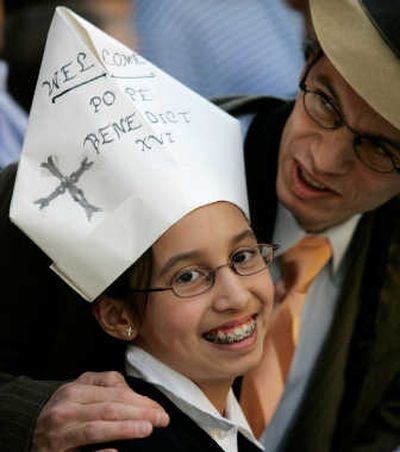Pope urges more multilateralism

UNITED NATIONS – Pope Benedict XVI on Friday called for collective diplomacy, and not “the decisions of a few,” to resolve conflicts and said human rights had to be based on “unchanging justice” and not the legal whims of the day.
Speaking at a special session of the United Nations, the pope also made a plea for religious freedom as a universal right.
Benedict flew to New York early Friday after wrapping up three days of meetings, Masses and speeches in Washington in which the recurring theme was the church crisis brought on by pedophile priests.
Later Friday, he chalked up a bit of history, making only the third visit by a pope to a synagogue and the first outside Europe.
“This momentous occasion,” said Rabbi Arthur Schneier of Park East Synagogue in welcoming the pope, “is a reaffirmation of your outreach, good will and commitment to enhancing Jewish-Catholic relations.”
At the U.N., normally formal diplomats and bureaucrats snapped pictures of the pope with their cell phone cameras and jostled to get close as he moved through the institution’s corridors.
Praising the founding principles of the U.N., Benedict said the world body should and does serve as an “active example” of how conflicts can be solved based on shared regulations and values.
“This is all the more necessary,” he said, when multilateralism is in crisis “because it is still subordinated to the decisions of a few, whereas the world’s problems call for interventions in the form of collective action by the international community.”
“What is needed,” he added, “is a deeper search for ways of pre-empting and managing conflicts by exploring every possible diplomatic avenue and giving attention and encouragement to even the faintest sign of dialogue or desire for reconciliation.”
Benedict did not single out countries or governments for specific criticism, but the Vatican frequently laments the stunted development of African countries and other impoverished places while the planet’s wealth concentrates in a few powerful nations. Some in the audience heard a rebuke of U.S. policy.
“I couldn’t help thinking he was talking about Iraq,” said Heraldo Munoz, Chile’s ambassador to the U.N., who helped organize the Security Council’s resistance to the Bush administration’s push to invade Iraq in 2003. The Vatican opposed the war.
“But he was also saying that if you want to tackle global warming, do it through the U.N. and not by going outside it,” Munoz added. “It was an argument on behalf of the U.N. and multilateralism for some member states who have a tendency to work outside the rules.”
The downy-haired pope was clad in white, except for his custom-cobbled pointed red shoes. More than 1,000 diplomats rose and applauded as he walked to the podium, and again as he departed.
The pope said human rights “at all times and for all peoples” had to be “principally rooted in unchanging justice,” which he asserts as a product of religious belief.
Benedict, invoking a favorite theme, added that one of the most basic human rights is the right to religious freedom. The U.N., he said, has a role in protecting that right, especially when it is seen as clashing with secular ideology or a majority rival religion.
“It is inconceivable, then, that believers should have to suppress a part of themselves – their faith – in order to be active citizens,” he said. “It should never be necessary to deny God in order to enjoy one’s rights.”